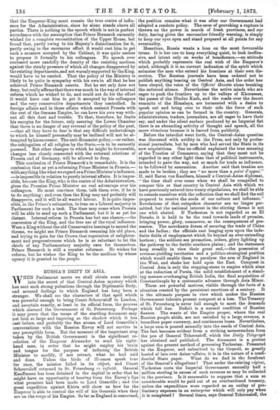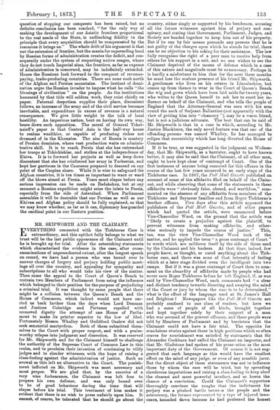RUSSIA'S DRIFT IN ASIA.
wTHEN Parliament meets we shall obtain some insight into the secret of that Central-Asian mystery which has sent such strong pulsations through the Diplomatic Body, and aroused feelings to which England has long been a stranger. We shall see the characters of that spell which was powerful enough to bring Count Schouvaloff to London, and ascertain exactly, at least in its official form, the process which alarmed the Government of St. Petersburg. Perhaps it may prove that the terms of the startling document may not look so large and imposing as the shadow which it has cast before, and probably the fine aroma of Lord Granville's conversations with the Russian Envoy will not survive in any perceptible form. But the measure of the important step taken by the British Government is the significant re- solution of the Emperor Alexander to send his right- hand man, in order that he might employ his brain and tongue for the purpose of inducing the British Minister to modify, if not retract, what he had said and done. Unless the birds of ill-omen speak true for once, the mission failed in its object, and Count Schouvaloff returned to St. Petersburg re infectd. General Kauffmann has been detained in the capital in order that he might have an opportunity of hearing from the Envoy's lips what promises had been made to Lord Granville ; and the great expedition against Khiva will show us how far the Emperor is able to control the will of his Generals when they are on the verge of his Empire. So far as England is concerned,
the position remains what it was after our Government had. adopted a resolute policy. The onus of provoking a rupture is thrown on the power in search of fresh provinces, and our dnty, having given the encroacher friendly warning, is simply to keep our eyes open and atand prepared at all points for any eventuality.
Meantime, Russia wants a loan on the most favourable terms. It is her cue to keep everything quiet, to look inoffen- sive, and intent only on works of beneficence,----an attitude which probably represents -the real wish of the Emperor's mind, although it is no current indication of the spirit which animates the men who extend his frontiers at their own dis- cretion. The Russian journals have been ordered not to publish anything bearing on Central Asia, and the order has been obeyed, the voice of the Official Gazette alone breaking the enforced silence. Nevertheless the active minds who are eager to push the frontiers up to the -valleys of Khorassan, the passes of the Hindoo Kush, and the roads over the desert summits of the Himalaya, are tormented with a desire to speak out and bring over to their side the force of such popular opinion as can be formed in the country. Generals, administrators, traders, journalists, are all eager to have their say, and under the silent surface produced by an Imperial fiat there is an abounding activity of thought and speech, all the more vivacious because it is barred from publicity. Before the interdict went forth, the Central-Asian question was discussed with avidity in the Press, not only by profes- sional journalists, but by men who had served the State in its new acquisitions. One ex-official explained the true meaning of the Treaties of Commerce, saying that they must not be regarded in any other light than that of political instruments, intended to pave the way, not so much for trade as influence, to be followed by annexation. Another said that treaties are made to be broken ; they are "no more than a point d'appui." If, said Baron von Kaulbars,,himself a Central-Asian diplomat, "the time shall ever come when we shall be compelled to conquer this or that country in Central Asia with which we have previously entered into treaty stipulations, we shall be able to console ourselves with the reflection that we shall find the soil prepared to receive the seeds of our culture and influence." Revelations of that outspoken character ara no longer per- mitted, but the national interest in the stirring theme is not one whit abated. If Turkestan is not regarded as an El Dorado, it is held to be the road towards lands of promise, bringing power, glory, commerce, as the consequences of pos- session. The merchants dream of securing the trade of China and the Indies ; the officials east longing eyes upon the inde- finite fields of employment which lie beyond an ever-extending horizon; the soldiers see promotion, orders, glory lighting up the pathway to the fertile southern plains ; and the statesmen keep steadily in view their great end,—the possession of revenue-yielding territories and a politico-strategical position which would enable them to paralyse the arm of England in the West, and shake her hold upon the East. Conquest in Central Asia is only the stepping-stone to empire which aims at the reduction of Persia, the solid establishment of a stand- ing menace overhanging British India, the final acquisition of Constantinople by a systematic advance through Asia Minor. These are powerful motives, visible through the facts of a situation created by the persistent exertions of a century. It is the ultimate purpose in view which makes the Russian Government tolerate present conquest at a loss. The Treasury of St. Petersburg is never full enough to meet the demands which fall due. Deficit is a normal condition of Russian finance. The wants of the Empire proper, where the real Russian people abide, are not satisfied by a large revenue, a boundless paper currency, and continuous loans. Nevertheless, a large sum is poured annually into the sands of Central Asia. The fact becomes evident from a striking memorandum from the pen of General Tchernaieff, which the Daily Telegraph has obtained and published. The document is a protest against the present method of governing Turkestan. Presented to the Emperor, and submitted to the Coivicil, so greatly busied of late over Asian "affairs, it is in the nature of a confi- dential State paper. What do we find in the forefront of the General's allegations ? That under the existing re'gime, Turkestan coats the Imperial Government annually half a million sterling in excess of such revenue as may be collected in the province. Is it reasonable to suppose that a sum so considerable would be paid out of an overburdened treasury, unless the expenditure were regarded as an outlay of pre- liminary expenses in an enterprise which will only pay when it is completed? Several times, says General Tchernaieff, the
question of stopping our conquests has been raised, but no definite conclusion has been reached, "for the only way of making the development 'of our Asiatic frontiers proportional to the real needs of the State, is unflinching fidelity to the principle that every acquisition should be compensated by the resources it brings us." The whole drift of his argument is that not the extension of frontier, but the mania for superseding local by Russian forms of administration creates the deficit, and con- sequently under the system of respecting native usages, where they do not touch Imperial aims, the frontiers, as far as expense of administration is concerned, may be indefinitely extended.
,to Hence the Russians look forward to the conquest of revenue- paying, trade-producing countries. There are none such north of the Afghan and Persian mountains. The instinct of domi- nation urges the Russian invader to impose what he calls "the blessings of civilisation" on the people. As the institutions honoured by that title will seldom work, they exist chiefly on paper. Paternal despotism supplies their place, discontent follows, an increase of the army and of the civil service becomes inevitable, and expenditure in excess of revenue is a natural consequence. We give little weight to the talk of local hostility. An imperious nation, bent on having its own way, bears down such opposition. The moral of General Teller- raaieff's paper is that Central Asia is the half-way house to realms wealthier, or capable of producing riches not dreamed of in the Khanatee. The aim of Russia is mastery of Persian dominion, where vast production waits on adminis- trative skill. It is to reach. Persia that she has entrenched her troops at Tchickishlar, and strikes at the independence of Khiva. It is to forward her projects as well as keep down discontent that she has reinforced her army in Turkestan, and kept her garrisons in the Caucasus prepared to descend on any point of the Caspian shore. While it is wise to safeguard the Afghan countries, it is ten times as important to warn or ward off the blows aimed at Persia. Years must elapse before any serious impression can be made on Badakshan, but at any moment a Russian expedition might seize the inlets to Persia, especially from the side of Asterabad. When Parliament assembles it will be desirable that our Persian as well as our Khivan and Afghan policy should be fully explained, so that we may know whether, as far as it can, diplomacy has guarded the cardinal point in our Eastern position.







































 Previous page
Previous page